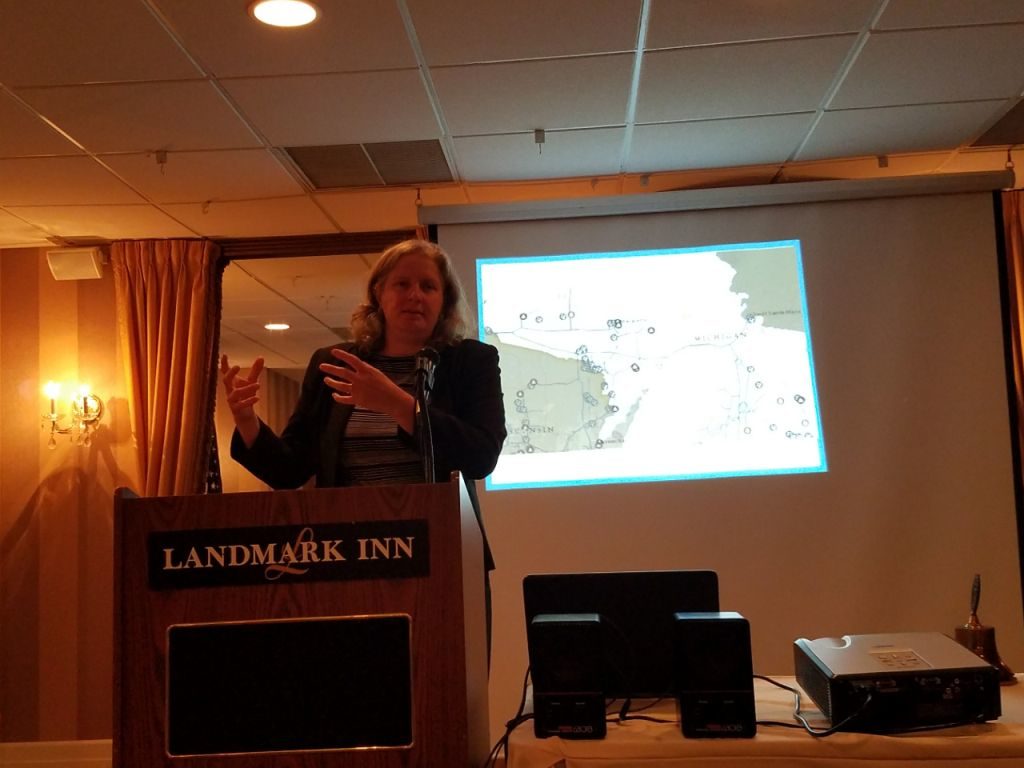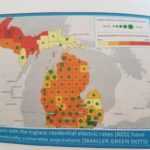Marquette, MI – August 17, 2017 – Yesterday the Marquette West Rotary was joined by Jennifer Hill to talk on a subject that effects all Upper Peninsula residents. With 20 years of experience and having worked on numerous cross section projects, Hill presented “Our Changing Energy System”.
“Calumet, Michigan pays the most for electric rates in the entire country,” Jennifer Hill stated. Despite being a town with electric trolleys and lights before Detroit, this town full of history now falls victim to the “complicated knot” that is our energy system.
With the development of electricity, a power grid formed across the country. Managed through a free market auction, the zones were based on historical connections like the Upper Peninsula mines and mills. Still working from this old system, the U.P. has becoming a patch work quilt of utilities.

Because providing electricity can be done as a monopoly, years ago residents granted companies the right to have a monopoly. At the time, for small towns in the Upper Peninsula, it made sense to purchase all of the towns power up front and then only need to maintain the wires throughout the year. While this technology worked for 100 years, it’s efficiency for residents is coming to an end and now U.P. home owners are paying the price.
Last year, the Upper Peninsula sent out $300,000,000 in electric rates, for an area home to only about 300,000 people. The U.P. is a wild mix of utility providers; rural electricity providers, co-ops, municipals, and larger company all exist in the Upper Peninsula. Hill then brought up a shocking image showing the regions in Michigan with the highest residential electric rates. The darkest areas also have economically vulnerable populations. Ultimately, we pay more when other areas of Michigan pay much less, for the same exact product. Some areas in the Upper Peninsula pay almost double the residential rate found in Alpena, Michigan.

Moving to talk on other energy sources, Jennifer Hill switched to the long term. In 2015, Michigan based, General Motors required 9 terawatt hours of electricity to build its vehicles and power its offices, tech centers, and warehouses. In 2016, GM committed to improving the energy efficiency of its operations. The transition, planned to be complete by 2050, will move 350 facilities in 56 different countries to renewable energy.
Walmart is also taking steps towards clean energy. Senior Energy Director, David Ozments said “The distributed generation pony has sort of left the barn – and we’re not going to put it back in.”
These large companies must think long term to protect their empire and success. The coal industry is the “American Way”. No one wants to give up on an American tradition, however, if these industrial icons are moving toward renewable energy, one might consider doing the same. While GM’s choice will have an enormous expense up front, there will be no continuous costs once the transition is complete.
One of the main questions Jennifer Hill is asked after hearing this is, “So how do we lower the rates?” Electricity has becoming a fundamental part of everyday life. We use cellphones as our form of communication. We use tablets to stream movies. We use the Amazon Echo to turn on our lights! Unfortunately there is no quick or easy answer to the question everyone is asking. It took years to create the situation we are in now, it will take years to change. Hill explained the steps that can be taken to help reduce electric rates in the Upper Peninsula:
- First, start reduce electricity usage. When consumers reduce their rates of usage, technical analysts will be able do the math and create a system for change.
- Consider other energy sources, ie: solar or wind.
- Attend the pulic hearing on September 19, 2017 at Northern Michigan University to review the new energy laws passed in December and what these changes could mean for the Upper Peninsula.
Hill closed mentioning that there are people in Calumet who have to debate even turning the Christmas lights on each year.
Interested in talking to Hill directly or bringing the “Our Changing Energy System” presentation to another event? Contact Jen Hill at (906) 227 2043 or email her jenhill@nmu.edu.





























